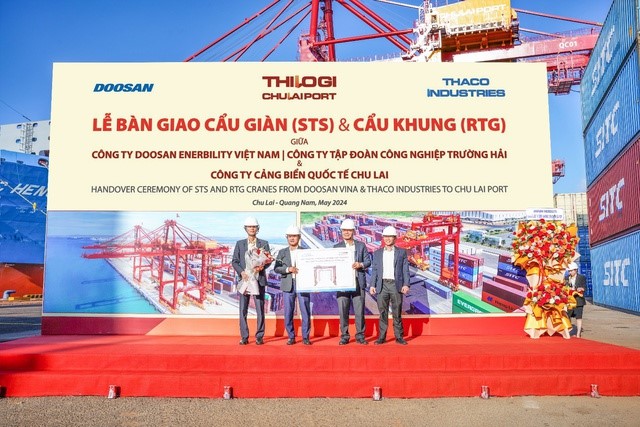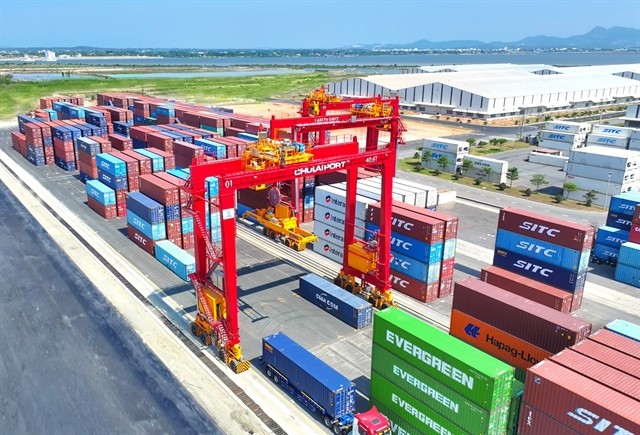Chu Lai International Port belonging to Trường Hải International Logistics Limited Liability Company (THILOGI) has installed a new specialised crane system that costs more than VNĐ400 billion (US$15.7 million).

Chu Lai International Port belonging to Trường Hải International Logistics Limited Liability Company (THILOGI) has installed a new specialised crane system that costs more than VNĐ400 billion (US$15.7 million).
This marks another milestone investment in upgrading specialised equipment in the port's development strategy to improve its loading and unloading capacity, increase the efficiency of the logistics service chain, and meet the constantly rising demand for transshipment of goods through seaports in the central region.
A ceremony was held on May 16 in Quảng Nam Province to hand over two ship-to-shore (STS) and three rubber-tyred gantry (RTG) cranes to the port, with the former being installed at terminal No.2 and the latter at the rear container yard.
Doosan Vina and THACO Industries manufactured the STS cranes from design and have transferred their operating techniques.
They are capable of loading and unloading 40-tonne containers with a reach of 40 metres, and are suitable for 50,000 DWT container ships.
The STS cranes together with the existing Liebherr cranes help speed up cargo handling by nearly 50 per cent by raising loading and unloading capacity to 100 containers per hour, an increase of 60 containers compared to before when these cranes were not in use.
The RTG cranes, manufactured by THACO Industries, have a width equivalent to six rows of 40-foot containers plus one lane for trucks, with a lifting capacity of 40 tonnes.
The cranes use the differential global positioning system (DGPS) to automatically steer and locate containers in the yard.
They along with a surveillance camera system and data connectivity on computers are gradually being completed installed.
Kim Hyo Tae, general director of DOOSAN VINA, said: "This is the first project on which we collaborate with THILOGI and Chu Lai Port. With THILOGI's support, the project was completed and handed over on schedule.
“After completing the Final Acceptance Certificate (FAC) stage, DOOSAN VINA transferred all operating techniques to Chu Lai Port. STS cranes are 100 per cent ‘made in Vietnam’ and suitable for wharf structures at the port."
On the same day container ship SITC HENGDE docked at the port and became the first ship to use the specialised crane, loading and unloading nearly 600 containers of goods, mainly agricultural products and raw materials and industrial products such as spare parts, medical equipment, garments, and furniture.
In less than six hours all the containers were loaded onto the ship.
This is expected to help businesses at industrial parks such as Bắc Chu Lai, Tam Thăng (Quảng Nam) and VSIP (Quảng Ngãi) speed up the import and export processes.
Previously, during a trial operation period, the port had selected a team of well trained and experienced technical staff and crane operators to ensure safe, stable and highly effective operation of the vehicles.
Fostering investment in equipment, elevating service quality

THILOGI has identified investment in infrastructure and equipment as one of the key measures to improve the quality of its logistics services.
Chu Lai Port is accelerating the construction of a 50,000-tonne terminal, which will open next month.
This year the port is investing in a fleet of tractors and 4,000HP tugboats to serve transportation needs and tow 50,000-tonne ships in and out the port safely and without a break.
It will also apply ePort software, e-customs clearance, e-payment, and PL - TOS software for bulk cargo handling to create more convenience for customers, and help them update vessel and cargo status in real time, save time and cost, and increase productivity and service efficiency.
According to Phan Văn Kỳ, general director of Chu Lai Port, the port will further improve operational quality, speed up cargo handling, review and cut wasteful steps to reduce handling costs, strengthen cooperation with State management agencies such as customs, border guard and the Maritime Port Authority, reform procedures, and standardize services in accordance with international standards to help brand positioning and attract more shipping lines and large domestic and international customers.
To achieve the goal of turning Chu Lai Port into an international logistics hub, and bring costs down to similar levels as at ports in the southern and northern parts of the country, it is focusing on investment for intensive development, finishing key projects, improving the capacity to exploit wharves, infrastructure, vehicles, and equipment. — VNS





